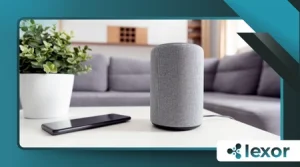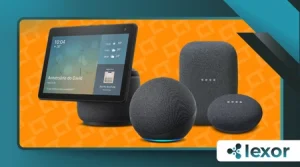Best Smart Speakers to Upgrade Your Living Room

Smart speakers are no longer just voice-controlled gadgets; they’ve become intelligent hubs that manage lighting, security, entertainment, and even your daily schedule.
With advancements in AI, spatial audio, and seamless smart home integration, choosing the right smart speaker in 2025 is more about matching your lifestyle than just comparing specs.
Do you prioritize cinematic sound for movie nights? Or do you need a device that effortlessly syncs with your existing smart home devices?
The competition is fiercer than ever. Brands like Apple, Amazon, Google, and Sonos are pushing boundaries with features like holographic displays, localized AI processing, and even mood-based automation.
But with so many options, how do you find the perfect balance between sound quality, smart features, and privacy?
Let’s dive deep into the best smart speakers of 2025, examining their strengths, weaknesses, and real-world usability—so you can make an informed decision.
The Evolution of Smart Audio: Beyond Alexa and Google
The first generation of smart speakers was all about basic voice commands and streaming music. Fast forward to 2025, and these devices have become the central nervous system of modern homes.
Take the Amazon Echo Studio (2025 Edition)—it now features adaptive spatial audio that analyzes room dimensions in real-time, adjusting sound dispersion for optimal clarity.
Meanwhile, the Apple HomePod 3 uses advanced neural engines to recognize individual voices, tailoring responses based on who’s speaking.
But it’s not just about better mics and speakers.
The integration of Matter, the universal smart home protocol, means devices like the Samsung Galaxy Home 2 can now communicate seamlessly with other brands, eliminating the old frustrations of incompatible ecosystems.
A key driver of this evolution is AI. OpenAI’s rumored Project Voice—set to debut late this year—promises conversational depth that could make interactions with smart speakers feel eerily human.
++The Best Smart Home Hubs Compared
Will this mark the end of robotic, scripted responses?
And then there’s holography. The Bose Soundbar 900 with HoloLens Integration doesn’t just play musi it projects a virtual DJ that reacts to your playlist.
Are we entering an era where smart speakers become immersive entertainment centers rather than just voice assistants?
Sound Quality vs. Smart Features: Striking the Perfect Balance

Not all smart speakers are created equal. Some prioritize audiophile-grade sound, while others focus on being the ultimate smart home controller.
The Sonos Era 500 is a prime example of a speaker built for sound purists. With Dolby Atmos support and upward-firing drivers, it creates a theater-like experience in your living room.
++Tablets vs Laptops: Which One Fits Your Lifestyle?
But it’s not just about raw power—its Trueplay tuning automatically adjusts EQ based on room acoustics.
On the other hand, the Google Nest Audio Pro sacrifices some bass depth for superior far-field microphone accuracy. This makes it ideal for homes where voice commands take priority over booming lows.
Then there’s the Bang & Olufsen Beosound A9 (2025), which blends Scandinavian design with adaptive sound profiling.
It learns your listening habits and tweaks audio output accordingly—like a personal sound engineer.
But here’s the dilemma: Do you want a speaker that disappears into your decor or one that makes a bold statement?
++What to Look for in a High-Performance Laptop
The Devialet Phantom II, with its striking design and 108dB of room-filling sound, certainly doesn’t shy away from attention.
The bottom line? Your choice depends on whether you see your smart speaker as a music powerhouse, a voice assistant, or both.
The Hidden Costs of a Smart Ecosystem
Buying a smart speaker often means locking yourself into an ecosystem. Apple’s HomePod 3 excels in privacy and seamless integration with iPhones, but it’s restrictive with third-party devices.
Amazon’s Alexa, meanwhile, boasts over 100,000 skills and works with nearly every smart home gadget—but at the cost of heavier cloud reliance.
Google Assistant strikes a middle ground, offering broad compatibility and strong AI, but its hardware sometimes lags behind competitors.
Read more: How to Build the Best Multiroom Wireless Speaker System for You
Then there’s Matter, the game-changing smart home standard. Speakers like the Eve MotionSync now support it, meaning you can mix brands without headaches.
But adoption is still growing—will 2025 be the year it finally unifies the smart home market?
Another factor is subscription services. Want lossless audio on your Apple HomePod? You’ll need Apple Music.
Prefer hands-free YouTube Music playback on Google Nest? That requires a Premium subscription. These hidden costs add up.
The lesson? Before committing to a smart speaker, consider not just the upfront price, but the long-term ecosystem investments.
Privacy Concerns: Is Your Speaker Always Listening?
One of the biggest hesitations around smart speakers is privacy. If a device responds to “Hey Alexa,” doesn’t that mean it’s constantly recording?
Manufacturers have made strides in addressing this. The Apple HomePod 3 processes most voice commands locally, minimizing cloud data exposure.
Amazon’s AZ2 Neural Edge chip does something similar, allowing Alexa to handle basic requests without internet access.
But concerns remain. In 2024, a study by Northeastern University found that some smart speakers activated accidentally up to 19 times a day.
While false triggers have decreased with better wake-word algorithms, the fear of unintended eavesdropping lingers.
For the privacy-conscious, solutions like Mycroft—an open-source voice assistant—offer an alternative. But can it compete with the convenience of mainstream options?
The trade-off is clear: more convenience often means less privacy. Where do you draw the line?
The Future: AI, Holograms, and Beyond
We’re entering an era where smart speakers do more than talk—they interact.
The Bose Soundbar 900 with HoloLens Integration projects a 3D DJ that syncs with your music, turning your living room into a virtual club.
Meanwhile, advancements in AI are making conversations with smart speakers more natural. OpenAI’s Project Voice (expected late 2025) could eliminate robotic responses entirely, making interactions feel like chatting with a friend.
Another trend is context-aware automation. Imagine your speaker detecting stress in your voice and playing calming music—or knowing you’re hosting a party and adjusting lighting accordingly.
The Samsung Galaxy Home 2 is already experimenting with mood-based responses.
Will the next generation of smart speakers replace screens altogether, relying on voice and holograms? The future is closer than we think.
Final Thoughts: Which Smart Speaker Fits Your Lifestyle?
Choosing the best smart speaker in 2025 isn’t about picking the most expensive model—it’s about finding the right fit for your needs.
- For audiophiles: The Sonos Era 500 delivers unmatched soundstage.
- For Apple users: The HomePod 3 offers seamless integration and top-tier privacy.
- For smart home enthusiasts: The Amazon Echo Studio (2025) excels in compatibility.
- For futurists: The Bose Soundbar 900 with HoloLens brings holograms into your living room.
The real question is: Do you want a speaker that blends into your life or one that transforms it?
Frequently Asked Questions (FAQs)
1. Which smart speaker has the best sound quality in 2025?
The Sonos Era 500 and Bang & Olufsen Beosound A9 lead in audio fidelity, with Dolby Atmos and adaptive sound tuning.
2. Are smart speakers always listening to me?
Most process wake words locally, but accidental activations can happen. Apple and Amazon have improved privacy with on-device processing.
3. Will Matter make all smart speakers compatible?
Eventually, yes. Brands like Samsung and Eve already support it, but full industry adoption is still in progress.
4. Do I need a subscription for full smart speaker functionality?
Some features (like lossless music) require services like Apple Music or YouTube Premium.
5. Are holographic smart speakers worth it?
If you want an immersive experience, yes. The Bose Soundbar 900 with HoloLens is a glimpse into the future.
References:
This guide ensures you pick a smart speaker that doesn’t just respond—it enhances every moment at home.
